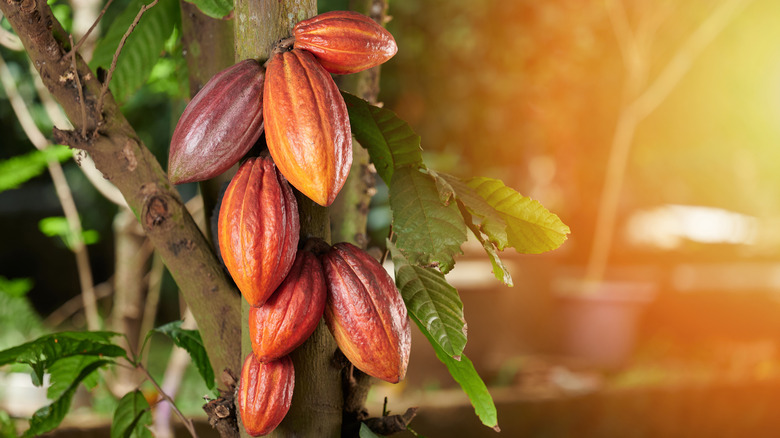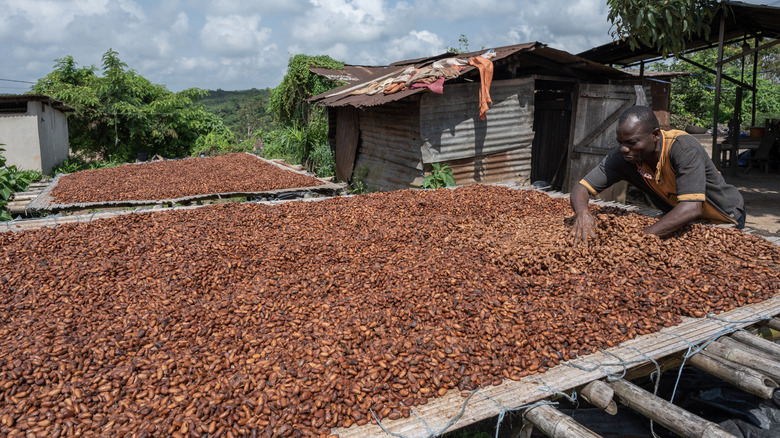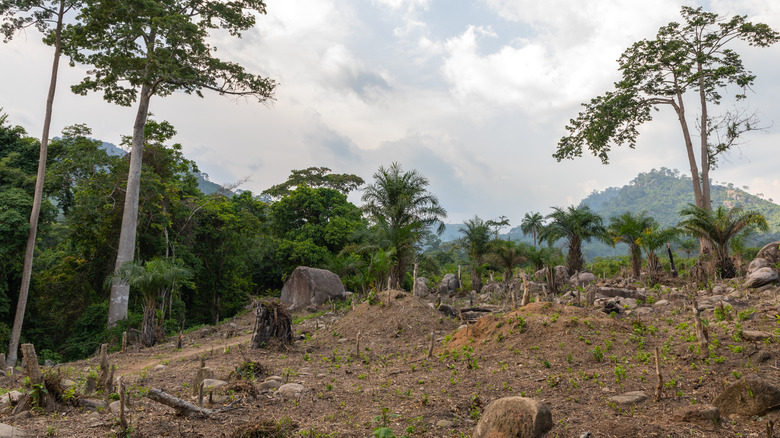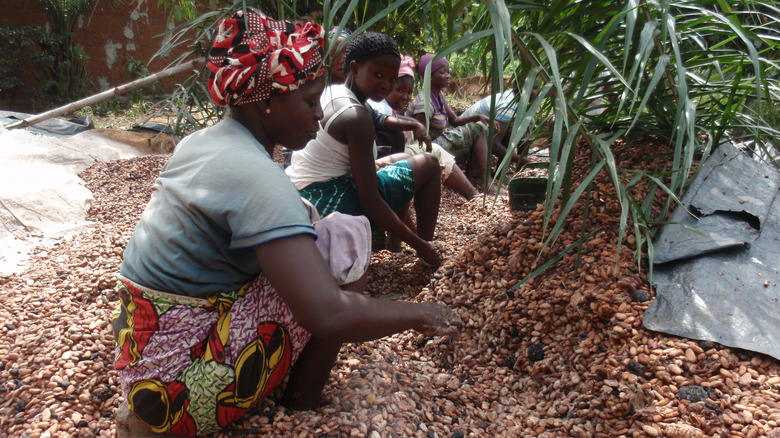The Country That Produces The Most Cocoa In The World
Cocoa and chocolate production is a multi-billion dollar industry. It's a driving force behind some of the world's most powerful food companies, including Nestlé, Mars, and the Ferrero Group. These massive brands have made chocolate an everyday item that most of us take for granted, but the very existence of the chocolate industry is nothing short of remarkable when you consider its origin.
Chocolate is made from cocoa beans, the fruit of cacao trees. These trees can only grow in very specific conditions; they need hot temperatures, high humidity, and lots of water. This type of tropical climate is only found within a narrow stretch of the planet, around the equator. The taste of cocoa varies by country, but you're unlikely to experience that variety because it mostly comes from the same place. While you can get some cocoa from Central America or South Asia, it's West Africa that dominates the industry.
The world's leading cocoa-producing country by far is Côte d'Ivoire (frequently anglicized as the Ivory Coast). According to Statista, Côte d'Ivoire produced 2.2 million tons of cocoa beans in 2022, nearly three times as much as the world's second-largest producer — neighboring Ghana — which put out 750,000 tons. Over a quarter of Côte d'Ivoire's population relies on cocoa for a living, but they reap just a tiny fraction of the chocolate industry's colossal profits. Now, a growing movement is fighting for farmers' rights, and it could drastically change the cocoa industry.
Côte d'Ivoire runs on cocoa
It's impossible to overstate how important cocoa is to the people of Côte d'Ivoire. In an interview with The Guardian, N'Zi Kanga Rémi — who governs the Adzopé Department just north of the nation's largest city, Abidjan— explained that virtually every aspect of life in Côte d'Ivoire is dependent on a robust cocoa industry. "My education was funded by cocoa! Our houses are built with cocoa! The foundations of our roads, our schools, our hospitals is cocoa! Our government runs on cocoa! All our policy focuses on sustaining cocoa!" he declared.
Farmers in Côte d'Ivoire grow and harvest raw cocoa beans, but they're largely excluded from the chocolate production process. Although cocoa is the defining ingredient in chocolate, some giant brands often undercut its value. The actual cocoa percentage of chocolate can vary significantly, and manufacturers may use minimal amounts to stretch their supply for the most products (and profit). Ultimately, it's the companies that sell the finished product that reap the real rewards.
Most of the cocoa produced in Côte d'Ivoire gets exported to Europe, where the largest producers are located. Few people in Côte d'Ivoire even get to eat the fruit of their labor. The average citizen eats only about a pound of chocolate per year, while the Swiss, who are the world's leading chocolate consumers, eat about 22 pounds annually (via World Population Review). The average American eats 10 pounds per year.
The dark side of cocoa
While the world's wealthy nations freely indulge in chocolate, farmers in Côte d'Ivoire reap little reward for their efforts. Per Al Jazeera, the nation produces 45% of the world's cocoa, but only receives 4% of the global profit. Farmers earn as little as $1,200 a year, and few have access to water pumps, sewage systems, or electricity. Women are particularly disenfranchised; they perform a majority of the steps in cocoa production, yet hardly any possess a legal title to the land they work.
The cocoa industry also has disturbing ties to child labor. Between Côte d'Ivoire and Ghana, over 2 million children work on cocoa plantations. In recent years, International Rights Advocates, an organization dedicated to ending child labor in the cocoa industry, has brought lawsuits against major chocolate companies, according to The Guardian. There have also been efforts by the U.S. and the EU to ban imports of cocoa linked to child labor.
Deforestation is another major concern in the cocoa business. According to Cocolectic, Côte d'Ivoire's vibrant rainforests are disappearing at a rate of 3% per year as more land is cleared for cocoa production. Most disturbingly, the Yale School of the Environment reported in 2019 that 40% of Côte d'Ivoire's cocoa crop is grown illegally on protected forest land. Native wildlife — particularly chimpanzees and elephants — have been devastated, and some forests have lost their entire primate populations.
How Côte d'Ivoire is changing the cocoa business
The cocoa industry is undoubtedly problematic, but recently, Côte d'Ivoire has made encouraging steps towards a brighter future. In 2018, the country's Minister for Water and Forests announced that the government would invest 616 billion CFA francs (equivalent to $1.09 million) in forest restoration, aiming to recover 20% of the nation's forests by 2030.
To increase farmers' profits, Côte d'Ivoire and Ghana established the Living Income Differential (LID) in 2020. This $400 per ton premium on cocoa exports goes directly to farmers. However, chocolate companies quickly found a loophole to avoid paying the fee. Instead of buying cocoa directly from Côte d'Ivoire, major brands like Hershey's and Blommer (North America's largest cocoa processor) have started buying their supply secondhand on futures markets to avoid the LID, according to Development Research.
One of the more promising developments in Côte d'Ivoire is the rise of Fairtrade co-op farms. Based around small villages, they work to end child slavery and preserve forest land. The director of Fairtrade's West African co-op initiative is Anne-Marie Yao, aka "Mama Cocoa," who's worked especially hard to empower women in the industry through her Women's School of Leadership. Women now run a growing number of co-ops, but a great deal of progress remains. Co-ops can only sell a limited portion of products on Fairtrade terms. Meanwhile, volatile markets around the world continue to have disproportionate consequences for the people of Côte d'Ivoire.



